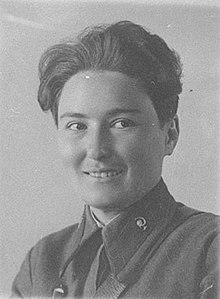Meri Avidzba
Meri Hafizovna Avidzba Russian: Мери Хафизовна Авидзба; 24 January 1917 – 12 April 1986) was a Soviet military pilot and navigator; she was the first female aviator from Abkhazia. She was awarded two medals for her actions in the Great Patriotic War (1941–1945), where she served as a navigator of the 46th Taman Guards Night Bomber Aviation Regiment, who were known by the Germans as the Night Witches. In later life she was elected a Deputy of the Supreme Soviet of Abkhazia.
Meri Avidzba | |
|---|---|
 | |
| Born | 24 January 1917 Abkhazia, Russian Empire |
| Died | 12 April 1986 Sukhumi, Georgian SSR, Soviet Union |
| Allegiance | |
| Service/ | |
| Years of service | 1941–45 |
| Rank | Lieutenant |
| Unit | 46th Guards Night Bomber Aviation Regiment |
| Battles/wars | World War II |
| Awards | Order of the Patriotic War |
| Other work | Deputy of the Supreme Soviet of Abkhazia |
Biography
Avidzba and her twin sister Hadzhera were born on 24 January 1917.[1][2] She attended Sukhumi School No. 10.[1] When Victor Argun, the first male Abkhazian pilot,[3] came to recruit aviators, Avidzba initially missed the opportunity.[1] She later joined the Red Banner School of the Civil Air Fleet in Bataysk.[1]
After graduating from Bataysk's Flight School, she joined Sukhum Flying Club as an instructor and worked there until it closed in 1939.[1] On 18 August 1936 she flew a demonstration flight in front of spectators, showing the crowds that Abkhazian women could become pilots.[1] On 30 December 1936 she circled her plane in a flypast over the funeral of Abkhazian communist leader Nestor Lakoba.[4]
Military career
In 1939 Avidzba joined the Military Medical Academy in Leningrad, but when she heard that war was due to be declared she volunteered to attend the fighter aircraft training school in Perm.[1] This transition was not easy and Avidzba had to appeal to the authorities in order to be transferred.[5] From Perm she moved to the military air school in Engels.[1]
In 1941 she was posted to the Finnish border, where she flew biplanes.[6] In December 1942, Avidzba was posted to the Caucasus region, as a navigator in the 46th Guards Light Bomber Night Aviation Regiment of the 4th Air Army of the 2nd Belarusian Front – beginning her career in the Night Witches.[1] Here she was under the command of Polina Makogon and Lydia Svistunova; due to their instruction with was soon undertaking solo combat missions.[1]
In February 1943, she flew with Polina Makogon on a mission, where three sorties repeatedly bombed the Germans in one night.[1] In September 1943, on a mission to bomb the port of Taman, Avidzba realised that the Germans were moving location – she reported the findings her flight had gathered to her commanders, who welcomed this previously unknown intelligence.[1]
In 1944, Avidzba's aircraft was hit by enemy fire and she received a severe spinal injury; however she hid the severity of the injury until the end of the war so that she could stay in the ranks.[1] This injury led to some partial paralysis, which was successfully treated with an operation seven years later.[7]
During the war, Avidzba flew 477 combat sorties, totaling over 1000 hours of time in the air and dropped 63,000 tons of bombs onto the enemy.[8] She fought in the North Caucasus, as well as on the 4th Ukrainian and 2nd Belorussian fronts.[8] She participated in the liberation of Crimea, Ukraine and Poland.[8] She crossed the front lines on 954 occasions.[7] Sadly, her brother Koka was killed in the war, and she wrote to her parents about how her work as a pilot avenged his death.[9]
Later life
After the end of the war, Avidzba returned to Sukhumi where she was active in the community, particularly in memorialising the Second World War, as well as being a governor of the school.[1] She was also elected a deputy of the Supreme Soviet of Abkhazia.[7] During her lifetime she was awarded the Orders of the Patriotic War (First and Second Degrees), the "For Defence of the Caucasus" Medal and the "For Victory over Germany" Medal.[1]
Avidzba died on 12 April 1986 in Sukhumi.[1]
Remembrance
Avidzba is remembered on stamps issued by the Republic of Abkhazia.[10] Her military papers, flying scarf and other items from her career as pilot were donated by her to the Abkhaz State Museum.[7] There is also a bust of her on display there.[11]
References
- "Fearless navigator Meri Avidzba". abaza.org. Retrieved 27 July 2020.
- "Meri Avidzba". www.abaza.org. Retrieved 27 July 2020.
- "Сухумский аэропорт". abkhazia.travel (in Russian). Retrieved 27 July 2020.
- Gregory, Paul R.,. Women of the Gulag : portraits of five remarkable lives. Stanford, California. p. 59. ISBN 0-8179-1576-1. OCLC 859581817.CS1 maint: extra punctuation (link) CS1 maint: multiple names: authors list (link)
- Harris, Adrienne. THE MYTH OF THE WOMAN WARRIOR AND WORLD WAR II IN SOVIET CULTURE.
- "Уроженцы Абхазии в Ленинградской битве 1941–1944". polk.press (in Russian). Retrieved 27 July 2020.
- ""Ночная ведьма" из Абхазии". Sputnik Абхазия (in Russian). Retrieved 27 July 2020.
- "Адвидзба Мери". tamanskipolk46.narod.ru. Retrieved 27 July 2020.
- "Абхазия в ВОВ". page5767048.html. Retrieved 27 July 2020.
- "Enveloping rage: Georgia starts a postal war with Abkhazia". RT International. Retrieved 27 July 2020.
- "В небе "ночная ведьма" – Мери Авидзба". Яндекс Дзен | Платформа для авторов, издателей и брендов. Retrieved 27 July 2020.
External links
- Film on Meri Avidzba's Life (in Russian)